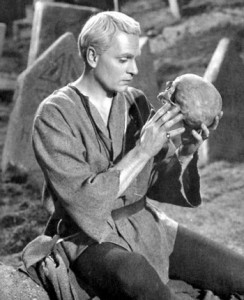This scene advances the plot when Horatio, Bernardo and Marcellus reveal to Hamlet that his father’s ghost has appeared. “A figure like your father, Armed to point, exactly, cap-a-pe” (1.2.199-200). It advances the plot as it drives Hamlet to confront the ghost and gives the ghost the opportunity to reveal the true nature of his appearance.
The hasty marriage between the recently deceased Hamlet senior’s wife and his brother is revealed and Hamlet (junior) proceeds to express his discontent, revealing some development of his character. This is evident when he says: “O most wicked speed, to post with such dexterity in incestuous sheets!” (Act I,ii,156). This instance reveals the attitude Hamlet may have towards the people around him and an evident hatred towards his mother and uncle.
In this scene, Hamlet’s opposition to King Claudius and Queen Gertrude is revealed. He says, ” Would have mourn’d longer, –married with mine uncle, My father’s brother, but no more like my father than I to Hercules” which shows his resentment in his mother’s sudden decision to marry his uncle, so early after his father’s death (Act I, ii, 151-153).
Hamlet also shows his disapproval of their marriage by dressing in black at their wedding celebration. Furthermore, Hamlet also says, ” She married:-O most wicked speed, to post with such dexterity to incestuous sheets!” (Act I, ii, 156-157). This makes Hamlet’s opposition to King Claudius and Gertrude evident to the audience.
Hamlet reveals an opposition towards Claudius. This is shown in his soliloquy when he states, “So excellent a king; that was, to this, hyperion to a satyr:” (Act1, 2, 139-140). This quotation shows Hamlet’s anger towards Claudius as he refers to his father as someone who is the likes of the sun-god in Greek mythology, while he compares Claudius to a lewd and promiscuous goat-like creature, who is unworthy of the crown.
This scene provides dramatic purpose as it advances the plot, provides contrast, suspense, and motivation for a later incident in the plot. During the scene, the scholar (Horatio) meets Hamlet to tell him he has seen his dead father (Hamlet Senior) as a ghost: “Been thus encounter’d. A figure like your father, Armed to point, exactly, cap-a-pe, Appears before them, and with a solemn march.” (Act 1, ii, __).
Suspense is created as it does not give Hamlet enough information to be satisfied with the appearance of his dead father. As well, in the Elizabethan time period, the unnatural is eerie and suspenseful.
This advances the plot and provides motivation for a further incident in the plot because it sends Hamlet on a quest for his father’s ghost and nothing can stop him, thus leading to his madness. It also contrasts the beginning of the scene from drinking, marriage and celebration to ghosts, suspense, and death.
This scene portrays the King as a manipulative person. “With mirth in funeral and with dirge in marriage, in equal scale weighing delight and dole.” (1, 2, 12-13). The King convinces the attendants in the castle that the marriage is a gift or blessing and that they should grieve no more.
Furthermore, the King manipulates the attendants, giving them the feeling that he thinks of them as a family in Act I Scene II Line 19-20. This shows the King is trying to win the support of the attendants as well as unite the country as one.

